Solar eclipse of December 24, 1992
| Solar eclipse of December 24, 1992 | |
|---|---|
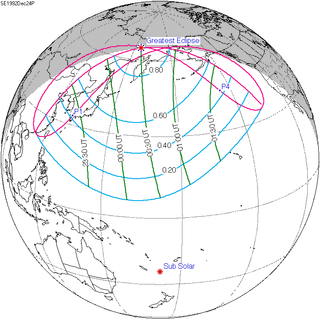 Map | |
| Type of eclipse | |
| Nature | Partial |
| Gamma | 1.0711 |
| Magnitude | 0.8422 |
| Maximum eclipse | |
| Coordinates | 65°42′N 155°42′E / 65.7°N 155.7°E |
| Times (UTC) | |
| Greatest eclipse | 0:31:41 |
| References | |
| Saros | 151 (13 of 72) |
| Catalog # (SE5000) | 9492 |
A partial solar eclipse occurred on December 24, 1992. A solar eclipse occurs when the Moon passes between Earth and the Sun, thereby totally or partly obscuring the image of the Sun for a viewer on Earth. A partial solar eclipse occurs in the polar regions of the Earth when the center of the Moon's shadow misses the Earth.
Images[]
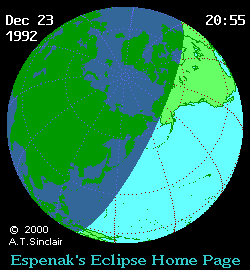
Related eclipses[]
Eclipses of 1992[]
- An annular solar eclipse (ascending node) on January 4.
- A partial lunar eclipse (ascending node) on June 15.
- A total solar eclipse (descending node) on June 30.
- A total lunar eclipse (descending node) on December 9.
- A partial solar eclipse (ascending node) on December 24.
Solar eclipses of 1990–1992[]
This eclipse is a member of a semester series. An eclipse in a semester series of solar eclipses repeats approximately every 177 days and 4 hours (a semester) at alternating nodes of the Moon's orbit.[1] This semester series contains only 7 eclipses.
| Solar eclipse series sets from 1990–1992 | ||||||
|---|---|---|---|---|---|---|
| Ascending node | Descending node | |||||
| Saros | Map | Gamma | Saros | Map | Gamma | |
| 111 | 1989 February 6 | -1.56550 | 116 | 1989 August 1 | 1.58396 | |
| 121 | 1990 January 26 Annular |
-0.94571 | 126 | 1990 July 22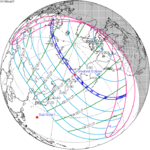 Total |
0.75972 | |
| 131 | 1991 January 15 Annular |
-0.27275 | 136 From Playas del Coco |
1991 July 11 Total |
-0.00412 | |
| 141 | 1992 January 4 Annular |
0.40908 | 146 | 1992 June 30 Total |
-0.75120 | |
| 151 | 1992 December 24 Partial |
1.07106 | 156 | 1993 June 20 | -1.56439 | |
Metonic series[]
The metonic series repeats eclipses every 19 years (6939.69 days), lasting about 5 cycles. Eclipses occur in nearly the same calendar date. In addition, the octon subseries repeats 1/5 of that or every 3.8 years (1387.94 days). All eclipses in this table occur at the Moon's ascending node.
| 22 eclipse events between December 24, 1916 and July 31, 2000 | ||||
|---|---|---|---|---|
| December 24–25 | October 12–13 | July 31-Aug 1 | May 18–20 | March 7–8 |
| 91 | 93 | 95 | 97 | 99 |
| December 23, 1878 | October 12, 1882 | July 31, 1886 | May 18, 1890 | March 7, 1894 |
| 101 | 103 | 105 | 107 | 109 |
| December 23, 1897 | October 12, 1901 | August 1, 1905 | May 19, 1909 | March 8, 1913 |
| 111 | 113 | 115 | 117 | 119 |
 December 24, 1916 |
October 12, 1920 |  July 31, 1924 |
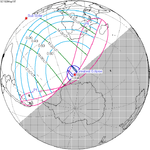 May 19, 1928 |
 March 7, 1932 |
| 121 | 123 | 125 | 127 | 129 |
 December 25, 1935 |
 October 12, 1939 |
 August 1, 1943 |
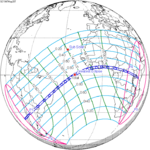 May 20, 1947 |
 March 7, 1951 |
| 131 | 133 | 135 | 137 | 139 |
 December 25, 1954 |
 October 12, 1958 |
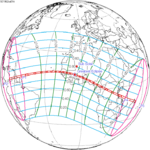 July 31, 1962 |
 May 20, 1966 |
 March 7, 1970 |
| 141 | 143 | 145 | 147 | 149 |
 December 24, 1973 |
 October 12, 1977 |
 July 31, 1981 |
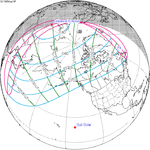 May 19, 1985 |
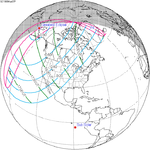 March 7, 1989 |
| 151 | 153 | 155 | 157 | 159 |
 December 24, 1992 |
 October 12, 1996 |
 July 31, 2000 |
May 19, 2004 | March 7, 2008 |
| 161 | 163 | 165 | 167 | 169 |
| December 24, 2011 | October 13, 2015 | August 1, 2019 | May 19, 2023 | March 8, 2027 |
References[]
- ^ van Gent, R.H. "Solar- and Lunar-Eclipse Predictions from Antiquity to the Present". A Catalogue of Eclipse Cycles. Utrecht University. Retrieved 6 October 2018.
External links[]
- Earth visibility chart and eclipse statistics Eclipse Predictions by Fred Espenak, NASA/GSFC
| Wikimedia Commons has media related to Solar eclipse of 1992 December 24. |
- Partial solar eclipses
- 1992 in science
- 20th-century solar eclipses
- December 1992 events
- Solar eclipse stubs



